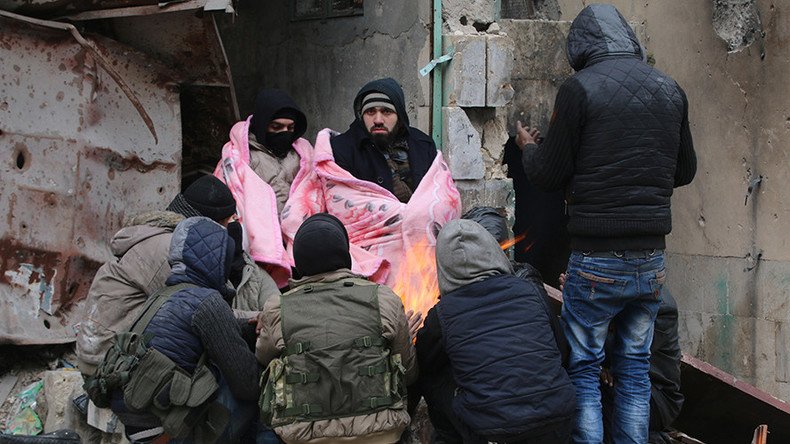‘Obama administration lost its game in Syria’ – Russian senator

The Obama administration did everything it could to defend the so-called moderate opposition, which is very closely connected with the jihadist groups in Syria, explains Aleksey Pushkov, Chairman of the Federation Council Mass Media Committee.
Russia’s foreign minister said Moscow, Tehran and Ankara have come up with a plan aiming to improve the situation in war-torn Syria. He added they are intended to bring about what he called “the revival of the political process to end the Syrian conflict.” The absence of the United States at the negotiation table prompted some uncomfortable questions for the US State Department.
RT: We’ve seen the failure of multiple groups working to resolve the Syrian conflict. The US has already expressed its share of skepticism about the ability of the so-called Troika on Syria to safeguard agreements and implement plans. How effective could this Troika between Russia, Iran, and Turkey actually be?
#BREAKING: #RussianAmbassador dies following shooting attack in Ankara - Foreign Ministry spokeswoman confirms https://t.co/oHK7ihnwn0pic.twitter.com/0uNjOiWJb6
— RT (@RT_com) 19 декабря 2016 г.
Alexey Pushkov: I would like first to express skepticism about the role of the Obama administration in the solution of the Syrian conflict. The administration did everything in its capacity to defend the so-called moderate opposition, which is in fact very closely connected with the jihadist groups in Syria. Today it became known that Jaish al-Fatah, an organization of which Jabhat al-Nusra is part of, has taken responsibility for the killing of the Russian Ambassador. And these are the people, who State Secretary John Kerry tried to win a pause for so that they can strengthen their position, get new ammunition and start their military actions again. I think the US has lost whatever initiative they had in Syria. It is only logical that these three countries [that] are playing a critical role in the possible solution of the Syrian conflict have met and decided to work on it together, especially so that the EU is virtually absent from the solution of the Syrian crisis – it follows blindly the US that is following a pass into a deadlock blindly.
RT: The format also sparked questions over Washington's decreasing role in the negotiations process. Do you agree that its influence is waning?
AP: I think the US influence is waning in a number of countries in the Middle East. The reason is that the US has engaged itself on the course of regime change that we are not capable of following. Democracies do not come instead of regimes that were disliked by the US. What came – was chaos and instability and terrorism. I think that the cards the US is playing within the Middle East today are rather weak. I have been comforted though by the statement made by Donald Trump, who said the recent terrorist acts in Switzerland, in Berlin, and in Ankara should make the civilized world change its thinking. Is the Obama administration capable of changing its thinking? I am sure it is not. All the dialogue that Russia had with the Obama administration has proved to be a sterile dialogue – it led to nothing. Basically it was stopped by the Russian side because the US was always trying to postpone the defeat of the military opposition in Aleppo, not really offering anything that would lead to the liberation of the city and to the promotion of the political process. So the Obama administration has lost its game in Syria. It is only logical that the new administration proclaims different goals. One of those goals is very close to Russia – is to fight terrorism. I think this goal is very close to the population of the EU and of the US too.
RT: Turning now to the murder of the Russian ambassador in Ankara. Who could stand to benefit from this?
AP: I tend to believe the version that the killer had connections with the jihadist organization in Syria. This is evidently a vengeance for Aleppo because the killing happened the next day after Aleppo was liberated and it became internationally known. So it is just a bloody retaliation. Now, does it have any political goals? I think that is an act of bloody, blind vengeance. I don’t think that those who perpetrated this vengeance thought that it would change Russian policy in Syria, or even break the new trends in the relations between Moscow and Ankara. It is evident that the Turkish government has nothing to do with that. I suppose it was just a desire to show that the terrorist organizations that are fighting Assad in Syria can retaliate. It is a display of might. It is very close to those terrorist acts that have no political meaning, but they are performed in Nice, Paris, Brussels, Berlin. What is the political goal of those terrorist acts? None – just to show the strength of the terrorists. And I think that this terrorist act in Ankara was a vengeance of the same kind.
The statements, views and opinions expressed in this column are solely those of the author and do not necessarily represent those of RT.












